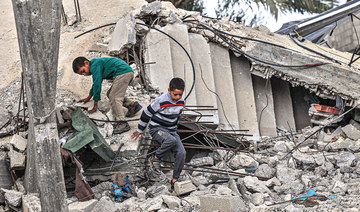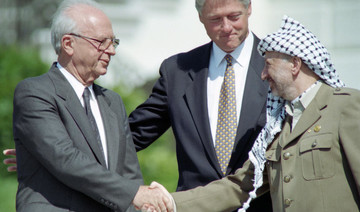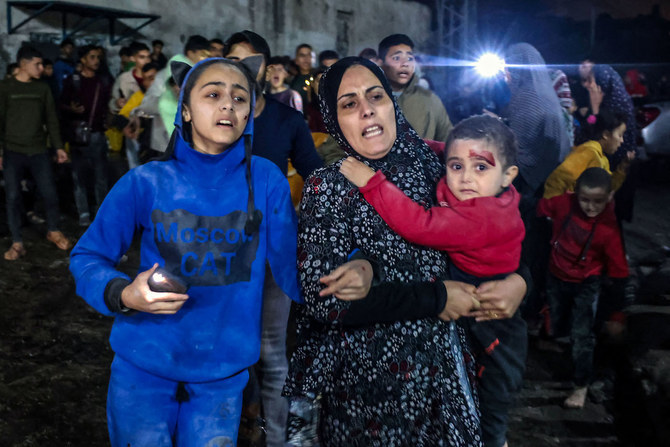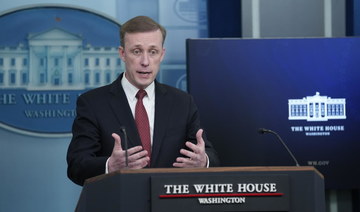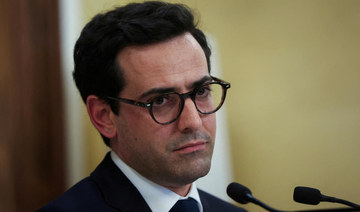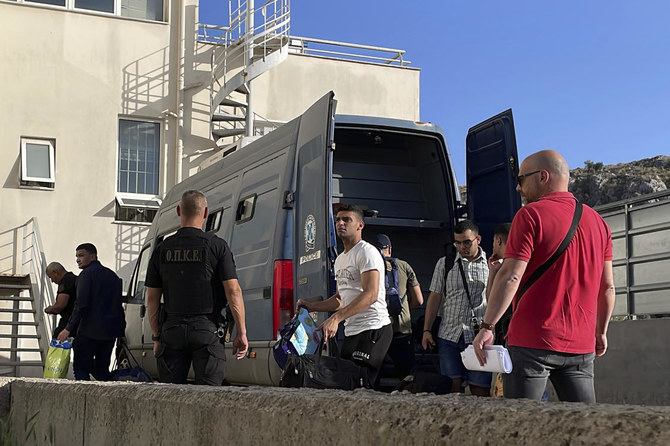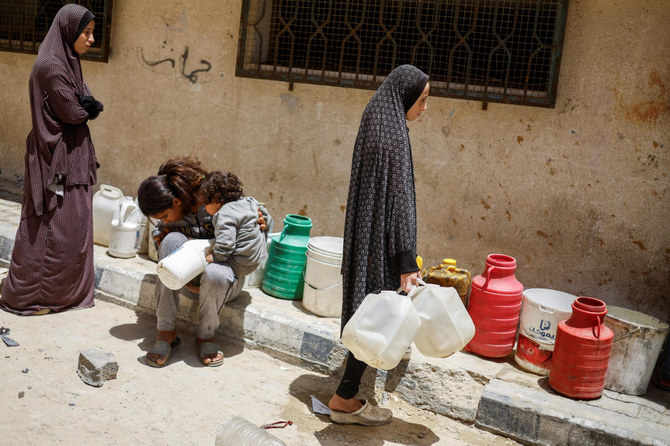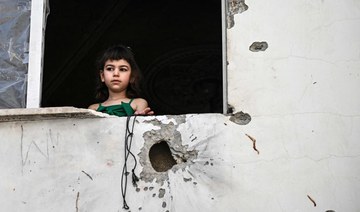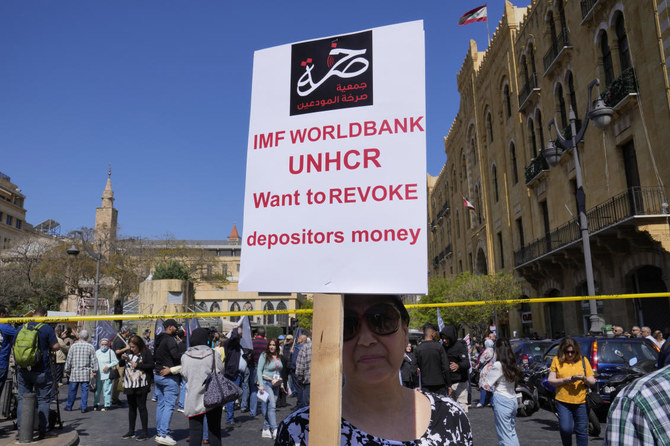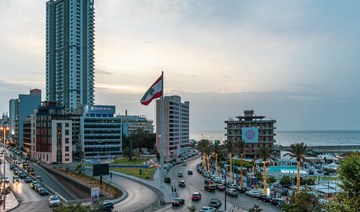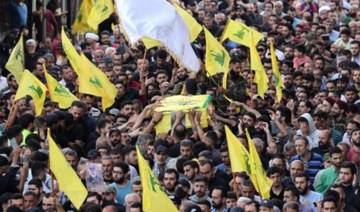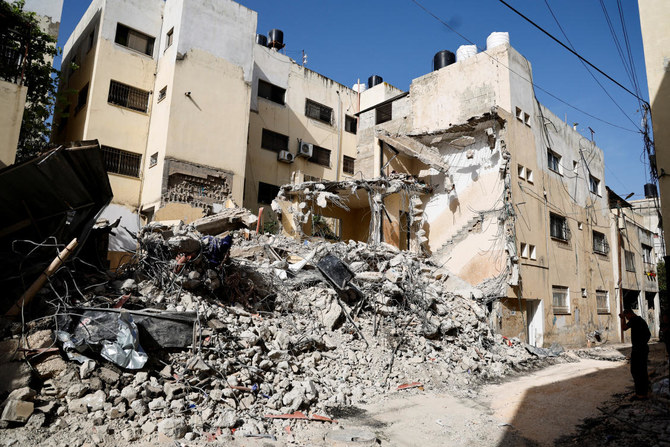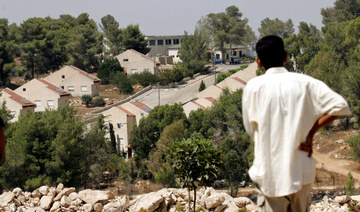LONDON: Monday, Sept. 13, 1993, was a sunny day in Washington and, for those gathered on the lawn of the White House, it seemed that a bright new era had dawned in the fraught relationship between Israel and the Palestinians.
The occasion was the formal signing of the Oslo Accords, a declaration of principles on interim Palestinian self-government that had been agreed in the Norwegian capital the previous month by Israeli and Palestinian negotiators.
It was a historic moment, and it produced a remarkable photograph that claimed its rightful place on the front pages of newspapers around the world: Israeli Prime Minister Yitzak Rabin and PLO Chairman Yasser Arafat smiling and shaking hands in front of a beaming US President Bill Clinton.

In this photo taken on Sept. 13, 1993, world leaders, dignitaries and peace advocates attend the historic signing of the Oslo Accords between Israel and Palestine at the White House lawn in Washington. (AFP/File)
With ironic timing, given the current tragedy unfolding in Gaza 30 years later, a unique memento of that day is being offered for sale by the Raab Collection, a US company that specializes in the buying and selling of important historical documents and autographs.
The single piece of paper, embossed with the golden seal of the President of the United States, and apparently torn from the White House program for the signing ceremony, is signed by all the key players on that hopeful day.

A unique memento of Monday, Sept. 13, 1993, is being offered for sale by the Raab Collection. The single piece of paper, embossed with the golden seal of the US president, and apparently torn from the White House program for the Oslo Accords signing ceremony, is signed by all the key players on that hopeful day. The document is offered for sale at $35,000. (Supplied)
According to Raab, which declines to reveal who put the document up for sale, it was “acquired from the archives of one of the important participants at the event.”
Each of the seven signatures has great value for any student of politics and history — here are the hands of Arafat, Rabin, Palestinian President Mahmoud Abbas, Israeli President Shimon Peres, US Secretary of State Warren Christopher, and Russian Foreign Minister Andrei Kozyrev, whose country had co-sponsored the 1991 Madrid Conference that set the stage for the Oslo Accords.
Taken together, they offer a bittersweet reminder of a moment when, in the words that day of an ebullient Clinton, “we dare to pledge what for so long seemed difficult even to imagine: That the security of the Israeli people will be reconciled with the hopes of the Palestinian people and there will be more security and more hope for all.”

PLO Chairman Yasser Arafat (2nd-R) and Israeli PM Yitzhak Rabin (2nd-L) sign a Palestinian autonomy accord in the West Bank during ceremonies at the white House in Washington, DC, on September 1995. (AFP/File)
Rather like a rare stamp, the value of which is increased by a printing anomaly, the document includes a curious discrepancy. It was signed on Sept. 13, the day of the White House ceremony, but only two of the signatories added the date to their signature. While Abbas wrote the correct date, the 13th, Arafat dated his signature the 14th.
The document is offered for sale at $35,000, but in political terms, with the hope expressed that day by Clinton that it was the gateway to “a continuing process in which the parties transform the very way they see and understand each other,” it is worthless.
INNUMBERS
• 10 Israeli prime ministers since the signing of the Oslo Accords in 1993.
• 4 Palestinian prime ministers since creation of the post in 2013.
As a reminder of the seemingly intractable nature of a conflict that has raged unresolved since 1948, the 30-year-old document is priceless.
One of the witnesses on the White House lawn that September day in 1993 was philosopher Jerome M. Segal, a peace activist who in the spring of 1987 had been part of the first American-Jewish delegation to meet with the PLO leadership.

Jerome M. Segal, a philosopher and founder of the Jewish Peace Lobby, was part of the first American-Jewish delegation to meet with the PLO leadership in 1987. (Supplied)
The following year Segal played a key role in negotiations that led to the opening of a dialogue between the US and the PLO, and a series of essays he published is credited with having informed the PLO’s decision to issue a Declaration of Independence and launch a unilateral peace initiative in 1988.
In 1993, as he watched Arafat and Rabin shaking hands, Segal, the founder of the Jewish Peace Lobby, had good reason to think that the elusive prize of peace might actually be within grasp.
Four days before the signing, Arafat and Rabin had exchanged letters, the former renouncing violence and acknowledging Israel’s right to exist in peace and security, and the latter recognizing the PLO as the representative of the Palestinian people and committing to peace negotiations.

Israeli President Shimon Peres at the Sept. 13, 1993, White House South Lawn ceremony. Each of the seven signatures on the document has great value for any student of politics and history. (AFP file photo)
It was agreed that a new Palestinian National Authority would be formed, and would assume governing responsibilities in the West Bank and Gaza Strip.
After five years, “permanent status” talks would be held to forge agreement on key issues to pave the way for the creation of a future Palestinian state, including borders, the right of return of Palestinian refugees, and the status of Jerusalem.
But Segal, and everyone else imbued with optimism on that bright September day, was to be disappointed.

PLO political director Mahmoud Abbas (2nd R) signs the historic Israel-PLO Oslo Accords on Palestinian autonomy in the occupied territories on September 13, 1993 in a ceremony at the White House in Washington, D.C. as (from L to R) Israeli Prime Minister Yitzhak Rabin, unidentified aide, US President Bill Clinton and PLO Chairman Yasser Arafat look on. (AFP/File)
Many reasons have been proposed for the withering of the olive branch of Oslo, but according to Israeli-British historian Avi Shlaim, writing in 2005, “the fundamental cause behind the loss of trust and the loss of momentum was the Israeli policy of expanding settlements on the West Bank, which carried on under Labour as well as Likud.”
This policy — which continues to blight relations between Israel and the Palestinians to this day — “precluded the emergence of a viable Palestinian state, without which there can be no end to the conflict.”
In a terrible pre-echo of the provocative visits to the Al-Aqsa mosque compound carried out recently by some of the right-wing members of Benjamin Netanyahu’s cabinet, Ariel Sharon, while campaigning to become Israel’s prime minister in September 2000, made a similarly controversial visit to the site.

Israeli security officers escort right-wing opposition leader Ariel Sharon (C) out of the Al-Aqsa mosque compound in Jerusalem's Old City on September 28, 2000, as his intrusion into Islam's third holiest shrine provoked a riot, leaving 29 people hurt and leaving peace efforts in tatters. (AFP)
The result was an outbreak of violent protests by outraged Palestinians. The Second Intifada would last almost five years and claim thousands of lives.
For Segal, director of the International Peace Consultancy, the failure of Oslo owes less to the supposed intransigence of the PLO over the years than to the internal dynamics of Israeli politics.
“The thing to realize about Oslo is that since 1993, the Palestinians have had only two leaders, Arafat and Abu Mazen (Mahmoud Abbas, the second and current president of Palestine),” he told Arab News.
“Their positions on final status were almost identical, so there has been a consistency on the Palestinian side of a willingness to end the conflict and recognize the State of Israel — even through the Second Intifada, that never changed, and it’s still there today.
“But on the Israeli side, we’ve had enormous flip-flops, from Rabin, to Peres, to Netanyahu, to Ehud Barak, to Ariel Sharon, to Ehud Olmert, and back again to Netanyahu.”
The precarious nature of peace talks for Israeli politicians was underlined in November 1995 when, just two years after shaking Arafat’s hand, Rabin was assassinated by a right-wing Israeli extremist opposed to the Oslo Accords.

World leaders stand behind the late Israeli Premier Yitzhak Rabin's coffin during his funeral at the Jerusalem Mount Herzl military cemetery on November 6, 1995. (ZOOM 77 photo via AFP)
“After Rabin’s death we have only had two Israeli prime ministers, Barak and Olmert, who have gone into serious final-status negotiations with the Palestinians,” said Segal.
Barak, who beat Netanyahu in the polls by a wide margin to become prime minister in 1999, “did it in a terrible context — the Second Intifada had already started.”
In 2000, Barak took part with Arafat in the Camp David Summit, which ended without agreement. As the violence continued in 2001, Barak stood for reelection as prime minister, losing to Ariel Sharon, one of the founders of Israel’s right-wing Likud party.

US President Bill Clinton (L) watches as Palestinian leader Yasser Arafat (C) confers with Israeli Prime Minister Ehud Barak (R) on July 11, 2000 at the Camp David presidential retreat in Thumont, Maryland. (AFP/File)
In 2006, Sharon was succeeded by Ehud Olmert, leader of the more liberal Kadima party. By 2009 he too would be gone, enmeshed in a series of corruption allegations and succeeded by Netanyahu.
“So, in the entire period since 1993, we’ve actually had only two Israeli prime ministers, and for a combined total of not more than three years, under whom there was a serious effort to pursue the final negotiations envisioned by Oslo,” Segal said.
That, he added, “leads to a very interesting question: Why, with the promise of ending the conflict, does the Israeli public regularly elect prime ministers who aren’t interested, like Netanyahu — why, as I heard Avi Gill (a former director-general of Israel’s Ministry of Foreign Affairs) put it, do Israelis poll left, but vote right?”

Israeli Prime Minister Benjamin Netanyahu's (L) appointment of far-right politician Bezalel Smotrich, a leader of landgrabbers, has only helped scupper any chance for peaceful co-existence between Palestinians and Israelis. (AFP photo/File)
The answer, Segal believes, “is because they don’t believe they are losing anything by doing so.”
Ironically, given the unwillingness of every Israeli leader since Olmert to compromise in the interest of peace, “even though they would support the two-state solution, they don’t believe there’s a Palestinian partner who will. In their mind they’re not losing a conflict-ending agreement they might get if they had a left-wing leader, so they end up going for Mr. Security.”
This, believes Segal, is a crucial factor in the ongoing failure to find the peace that seemed so close in 1993.
“You have to deal with this, what I call ‘no-partnerism,’ the dogma that there is not, and has never been, a Palestinian partner for peace, because this is not just a Netanyahu thesis. It’s one that’s deep in the belief structure of the majority of Israelis.
On Oct. 6, the eve of the Hamas-led attack on Israel, Segal was optimistic that a breakthrough was close.
In his book “The Olive Branch from Palestine,” published in 2022, he had urged “a Palestinian return to unilateral peacemaking, with the Palestinians taking the lead in establishing ... a UN commission through which the Palestinians would advance, in full detail, without any ambiguity, the end-of-conflict, end-of-claims agreement that they are prepared to sign.”

This he dubbed UNSCOP-2, an allusion to the UN committee formed in 1947, which proposed the original partition plan for Palestine.
“On Oct. 6, I believed that we could get major changes through the UNSCOP-2 process. I believed that a committee could be created in a matter of months, that all I had to do was to get Abu Mazen across the line, to get him to go from calling on the secretary general of the UN to do something to doing something himself in the General Assembly, and we could move very rapidly.
“We talked to many countries at the UN. We even talked to Iran, and nobody was opposed. I believed that we could then put in front of the Israeli public something that in decades of conflict they have never had, which is a Palestinian ‘Yes’.”
By training a philosopher, Segal remains philosophical, despite the disastrous events of the past seven months.
“On Oct. 6, I was optimistic for the short term. Now I see the timeframe is very different, but I do have proposals. Our approach after Oct. 7 is what you could call ‘Gaza-first’.”

Israelis light 25,000 candles at Rabin Square in the Israeli coastal city Tel Aviv, on October 29, 2020, ahead of the 25th anniversary of the assassination of former Israeli Prime Minister Yitzhak Rabin, Rabin was gunned down in Tel Aviv after a peace rally on November 4, 1995 by a right-wing Jewish extremist Yigal Amir. (AFP)
This is the reawakening of a plan first proposed by Segal in 1995 at the request of Israeli Prime Minister Peres — the idea that while granting Palestinians sovereignty over the West Bank might be an initial step too far for most Israelis, an experiment in Palestinian statehood limited at first to Gaza might win their confidence and, ultimately, lead to an Arab state that includes the West Bank.
In 1995, it was Arafat who rejected the plan, fearing not unreasonably that “Gaza first” would come to be “Gaza last,” with the PLO confined to the coastal strip in perpetuity, even though “I presented a 20-point proposal designed to give the PLO confidence that they wouldn’t get stuck in Gaza.”
The reason, Segal believes, is because Oslo was still alive, and it made sense for the PLO to hold out for what would prove to be the illusory promise of final-status talks.
Now his view is that “Gaza first” offers the only realistic hope of progress.
As he wrote in a column for Foreign Policy on Feb. 6, in the wake of Oct. 7 “no Israeli government will ever agree to a Palestinian state in the West Bank unless there is substantial confidence that it will not be a threat to Israel.”
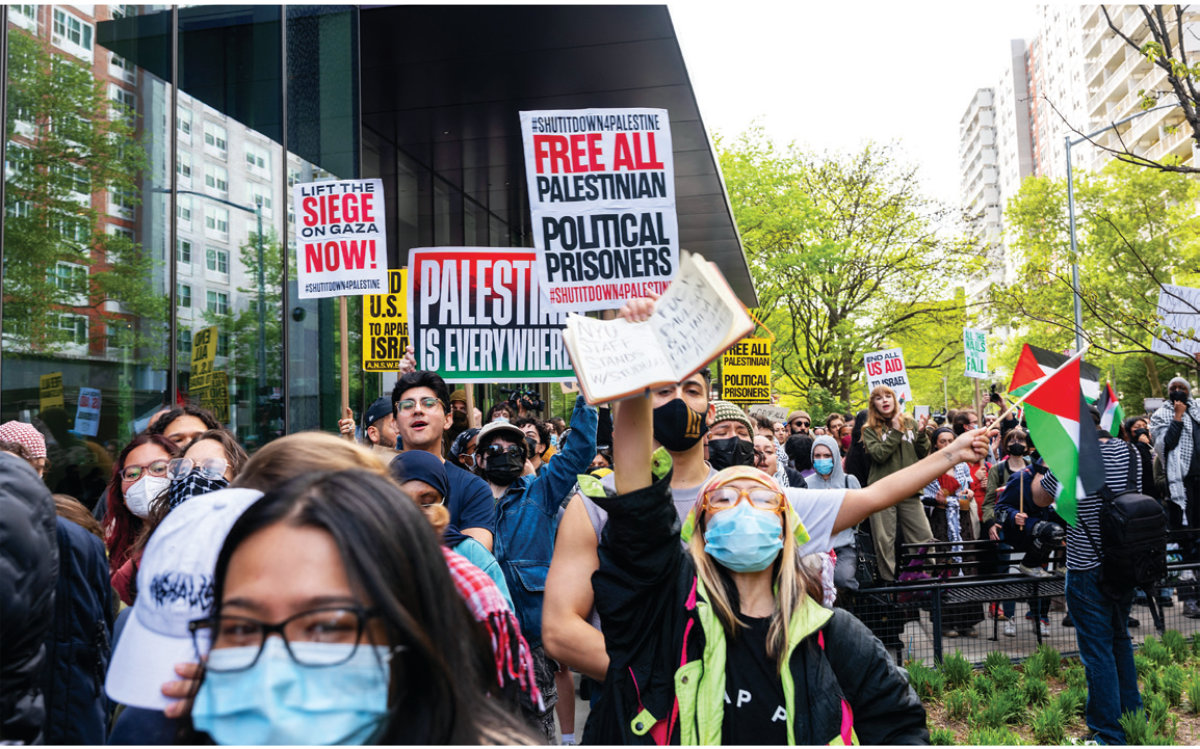
Nearly 30 years on since Israeli assassins killed the Oslo Accords, shockwaves of the conflict are being felt even in college campuses around the world. (AFP)
If there is an answer, Segal concluded, “it will require abandoning the defunct Oslo paradigm, which sees Palestinian statehood emerging as a result of successful end-of-conflict negotiations.
“The alternative is a sovereignty-in-Gaza-first approach, to test Palestinian statehood in Gaza first and, only if it is successful over an agreed period, to then move to negotiations on extending Palestinian sovereignty to the West Bank.”
Right now, Segal’s dogged commitment to the peace process is as admirable as it is remarkable.
But, in the face of a general lack of alternative proposals, it perhaps also offers the best hope of achieving Clinton’s wish, expressed on the White House lawn over 30 years ago, that “two peoples who have both known the bitterness of exile” might “put old sorrows and antagonisms behind them ... to work for a shared future shaped by the values of the Torah, the Qur’an, and the Bible.”







